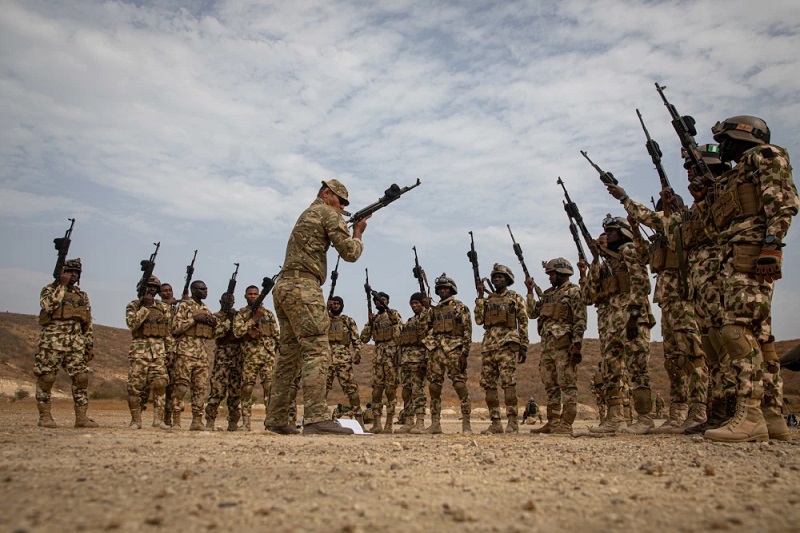As violent extremism in West Africa’s Sahel region spreads southward toward coastal states, the United States military has initiated its annual military training exercise with the objective of assisting other armies in containing the jihadi threat. This week marked the beginning of the yearly U.S.-led exercise known as Flintlock, which provides training in counter-insurgency tactics to military personnel from a variety of African nations.
Approximately 1,300 military personnel from 29 countries are undergoing training in Ghana and the Ivory Coast. This comes in the wake of a surge in jihadi violence connected to al-Qaida and the Islamic State group, which has resulted in the deaths of thousands, the displacement of millions, and the collapse of countries.
Most extremist activity is in the inland Sahel region of West Africa, which includes Mali, Burkina Faso, and Niger. However, the violence is quickly spreading to coastal states like Ghana, where attacks by unknown groups that could be linked to jihadis are on the rise. According to the Armed Conflict Location & Event Data Project, there was only one violent event in Northern Ghana in 2021 that was linked to an unknown armed group. In 2022, however, there were 19 such events.
This year’s Flintlock, an event that lasts for two weeks, is taking place in the midst of increasing anti-French sentiment in West Africa. Mali and Burkina Faso have terminated their military collaboration with France, citing frustration that the French military presence in the region over the course of several years has done little to halt the expansion of Jihadi violence. The military juntas that currently rule Burkina Faso and Mali are now receiving military assistance from Russia. Additionally, Mali is collaborating with the private mercenary organization known as the Wagner Group. The United States has expressed its desire to work with African nations to combat the danger posed by extremists before it can spread further across the region.
Related Posts
On March 9, 2023, a Ghanaian soldier participated in hook and climb exercises while participating in Flintlock 2023 on a Spanish frigate at Tema port in Ghana. U.S. Colonel Rob Zyla, the deputy commander for Special Operations Command Africa, was quoted as saying that “if the instability gets too broad or too bad, then it opens the aperture for other malign actors to try and influence and corrupt the messaging in order to gain access to some of these governments.”
According to what he said, the United States will not be increasing the number of soldiers it has stationed in West Africa; however, special operations forces from the United States will continue to perform joint training with partners based on the needs and requests of those partners. At Flintlock, for the first time, there is a site dedicated to maritime training. This site is where military forces practice search and seizure as well as other tactics, with the goal of thwarting the increasing threat of piracy in the Gulf of Guinea.
According to Ghanaian military officials, they are concerned that jihadists will soon work with pirates to make the waters unsafe, which would limit commercial activity for the countries that are located along the coast. “We already know that they have intent to link up with piracy and enhance operations,” said Col. William Nortey with the Ghanaian army. “According to what he had stated, “that would be a game changer for the littoral (coastal) states, so we need to prevent this at all costs.”
As the extremist violence spreads southward, Ghana is investing money to beef up security along its frontier. President Nana Akufo-Addo announced this week in his State of the Nation address that the country will be purchasing more than one hundred armored personnel carriers, among other pieces of equipment. According to him, “the reality of the state of affairs in our neighborhood demands that the government go to great lengths to ensure the security, safety, and stability of our nation.” This is what he said. “The reality of the state of affairs in our neighborhood” The Accra Initiative is a military platform that involves Burkina Faso and neighboring coastal countries in order to combat the further spread of extremism in the Sahel region. Ghana is a participant in the Accra Initiative.
Regional experts say that the fact that violent extremism has spread across the Sahel shows that a multifaceted approach, not just a military one, is needed to stop the insurgency from moving to the coast. Rukmini Sanyal, a researcher from Ghana who works for the Economist Intelligence Unit, says that conditions like widespread poverty, high inflation, and a lack of jobs for young men make it easy for jihadists to recruit people. She said, “An example of something that worries me is the ongoing conflict between the Mamprusi and Kusasi ethnic groups in northern Ghana’s Bawku region over who is the chief.” This conflict is happening in a place where a lot of people are unhappy, which could make it easier for militants to get in. She said that the government needs to come up with a plan that has more than one part and focuses on building community resilience as well as more traditional security measures.
Also Read:- Is Bolt Safe In South Africa?

